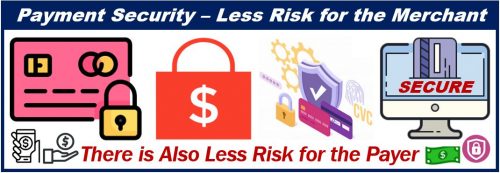As more and more transactions are performed online by increasingly on-demand consumers, the technological developments that have occurred to meet that need have also created new opportunities for cyber-criminals. Merchants operating in the physical, online or omni-channel space need to provide the highest level of payment security to assure customers that their data is safe.

There are a number of ways to create a secure payments experience and we’ll look at some of those shortly. Wrapping that experience with complete encryption and layers of fraud prevention tools including a transaction monitoring solution is vital. Not only are there legal obligations that fall to you as a merchant, but it also builds trust between you and your customer base.
It can be difficult to manage all the intricate measures required to make sure your transactional data is safe. That’s why a robust transaction monitoring solution, one that combines both payment processing and effective anti-fraud protection, is essential. More than ever before, consumers are concerned about the safety of their data and won’t hesitate to withdraw their loyalty if they feel it has been compromised in any way. Here are some of the most important considerations which can keep transactions secure.
Address Verification
AVS (Address Verification Service) is a security measure used to prevent fraudulent transactions on debit and credit cards. It allows you to verify the billing address provided by the cardholder and one that is associated with the card. A response code lets you know whether the transaction should be accepted or rejected.
SSL protocol
When transacting any online payments, it is crucial that your website has been enabled with an SSL protocol. It helps you to encrypt information that goes through the site, such as credit card details and sensitive data that customers share during the checkout process. The SSL certificate comes with many benefits for your business, and its padlock icon lets customers know that you take data security seriously. This helps build your online reputation, credibility, and trust.
Tokenization
Tokenization further improves payment security by transcoding customer details into random strings of numbers, or tokens, that replace sensitive data during the transaction process. Because of highly specialized end-to-end encryption, the tokens are meaningless if intercepted and therefore useless to fraudsters.
PCI Compliance
PCI DSS is a set of security regulations with which a merchant who process, store, or transmit credit card data must be compliant, yet many are not. Because the registration process can be cumbersome, organizations choose to work with payment providers who provide it for them.
Monitoring Fraud
Despite the best will in the world, cyber-criminals will take advantage of a careless business. You need to stay alert to infractions by monitoring your orders and customer trends for irregularities, and reacting promptly whenever flags are raised. These actions help ensure secure payments experience and continue to build trust.
It rests with you to implement a transaction monitoring solution, to keep the purchasing process under control and payment data secure. Your customers will reward you for it.
Interesting Related Article: “Online Payment Methods and Financial Advantages Beyond The Pandemic“

